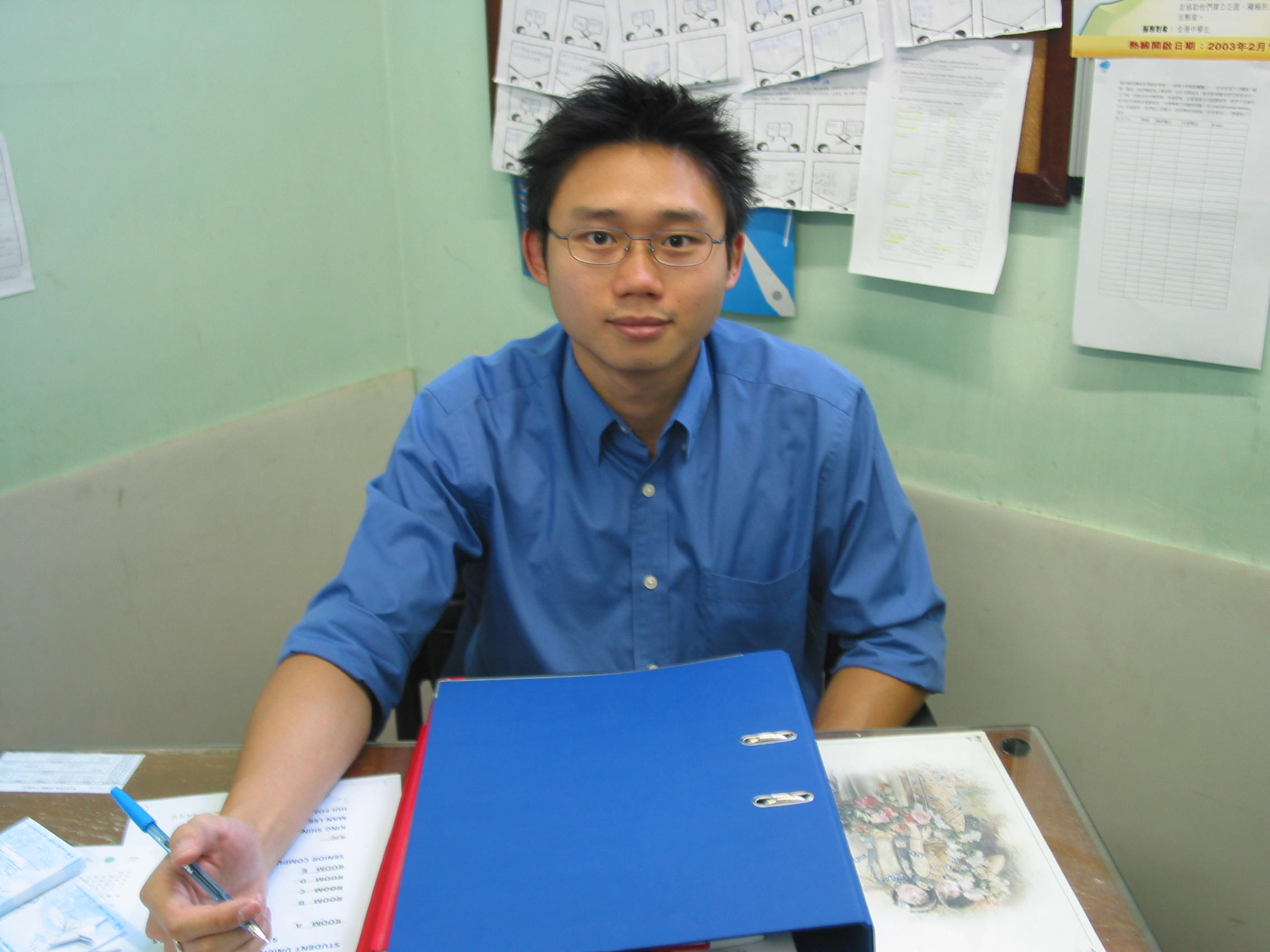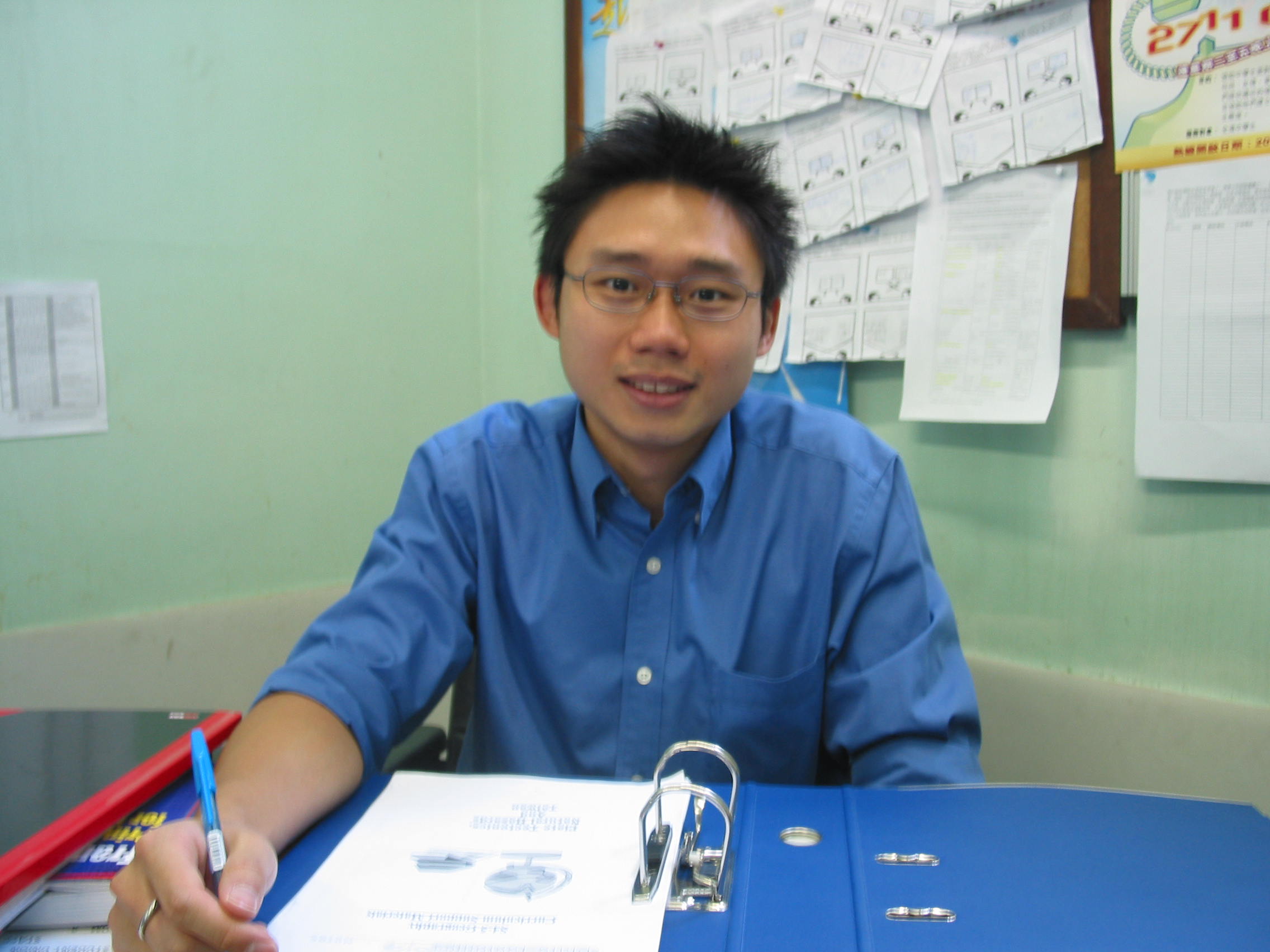| ¡@ |
(Interviewed by Thomas Li and Michael Wong)
Interview with Mr. Wong, our school social worker
 Q:
What did you do before being our school's social worker? Q:
What did you do before being our school's social worker?
A: Actually, I had been
a social worker ever since I graduated from the Chinese University
of Hong Kong. I wasn't a school social worker at first, instead
I worked for the mentally handicapped and the rehabilitation
of mentally retarded people. After working for some time,
I was sent to schools as school social worker. In fact, St.
Joseph's College isn't the first school I work for; it was
actually a school in Kwai Chung. Then, the School Social Work
Service
Department of the Hong Kong Family Welfare Society sent me
here.
Q: So,
you didn't come to our school by choice?
A: No, I didn't. I was
sent here, and in fact I knew little about this school until
I came and started working here. I took up the place of Mr.
Wan, your school's former social worker.
Q: Do you
know Mr. Wan deeply?
A: No, I don't. As you
know, he was your school's former school social worker, and
by the time I took up the job at your school, he had already
left. However, we did worked together in a project before.
It was a voluntary activity held last year; we were to visit
and give supplies to the elderly who lived on the outlying
islands. This project has even been broadcasted on television!
In spite of this, we didn't know each other well.
Q: Why
did you have the idea of being a social worker?
A: It all started when
I was in secondary school. I was troubled by quite a few problems
in school and I decided to find my school social worker for
help. Even though he didn't help much in solving the problems
I've had, I felt a lot better, and I had more confidence in
myself afterwards. His guidance was really effective and from
then on, I had been thinking that it is enjoyable in helping
others through guidance and encouragement. I had seriously
considered social worker as my future career during my years
in Form 6 and 7.
Q: Did
you need a degree or other qualifications to be a social worker?
A: Definitely. There is
a compulsory course about social work in my university. We
had to pass in a qualification test in order to become a social
worker. As a school social worker, we must have a degree in
social work, not psychology, as many people might have thought
of. We must also finish a three-year university course too.
As for psychology, it was just a subject that we could take,
but not necessary in social work. Psychology and social work
are, in fact, two different things.
Q: What
do you think of us, Josephians?
A: Well, Josephians give
me the impression of confidence and willing to face challenges.
I think it is because of the freedom the school gives you.
Josephians are polite and have a high sense of leadership.
Your abilities to write proposals and organise activities
make you almost the same standard as university students.
Maybe it is because this school is well-known, so many students
themselves have high expectations.
 Q:
How do you help students who are in trouble? Q:
How do you help students who are in trouble?
A: People often think
that a social worker's job is to solve problems. But that
is a wrong idea. In fact, our main job is to encourage students
and walk with them through difficult paths in life, such as
their emotions and what they think. Social workers have a
saying, ¡§Help yourself, and help others¡¨. Solving problems
for students is notmy chief aim, but rather to help students
solve problems is my duty.
Q: Are
there any special cases you can share with us?
A: Well, there aren't
any major cases that have happened in St. Joseph's College,
but I had an unforgettable experience in the school in Kwai
Chung. In that school, a Form 1 student was involved in triads.
He was a problem student and never studied his schoolwork;
his parents couldn't help him. He was often fighting with
other people and his body was covered with bruises and wounds.
The police arrested him a number of times too. One day, he
came to me with fear in his eyes and told me, ¡§There's a gang
waiting for me after school to beat me up. It must be the
people who wanted revenge after I fought them. Please help
me.¡¨ Now this boy was not afraid of anything, but at that
moment, I saw that he was extremely terrified. So, I immediately
asked his class-teacher to walk with him back home and I contacted
the police to patrol in the streets near the school and the
student's residence. Luckily, nothing happened on his way
home from school. This stayed in my mind for a long time.
I don't know how he is doing now because I changed school,
but I really hope that he has changed into a hard-working
student.
Q: What
do you think of our school's ¡§Junior Counsellor Scheme¡¨?
A: This scheme has been
introduced for a few years and, believe me; the results of
the first few years weren't so fruitful. We found out that
the counsellors were initially energetic to help the Form
Ones, but after a few months, they started to neglect them.
Maybe it was because they were too busy themselves to pay
attention to them. Also, some Form 1 students thought that
they did not need a counsellor to help them at all. But I
don't think the ¡§Junior Counsellor Scheme¡¨ is a failure at
all, because some counsellors really cared about the Form
1 students and helped them throughout the term and also kept
in touch after going on to higher forms. This year, I will
hold more meetings with the counsellors to solve their problems
on their work.
Q: Do you
have any chance to cooperate with the teachers?
A: Oh yes, I definitely
cooperate with them. There are two main areas. The first area
is cases; I might need to know how the students respond at
classes. After getting the student's permission, I will approach
the teacher and consult him or her. I hope to understand more
about the student. The teachers are extremely helpful too.
They have the same aim as mine: to help students improve more
in their studies and conduct. The second area is about programmes;
I might invite teachers to some speeches or camps. Of course,
the teacher whom I have co-operated most is Mrs. R. Wong,
for she is the school counsellor and we run the ¡§Student Counsellor
Scheme¡¨ together.
Q: Do Form
1 students come to you the most?
A: Not really. Many form
1 students come to me, I think it's because my room is close
to them. But the students and cases that I see mostly come
from other forms, such as forms 3 and 4.
Q: What
are your future plans for our school?
A: Well, I¡¦ll try my best
to make programs for each form of students. This year, Form
1 students will have some talks about puberty and adaptation
to the new environment while Form 4 and 6 students may have
some talks about "love".
Q: Do you
have anything you want to say to everyone?
A:
Yes. Parents and students may think that seeing a social worker
is a very embarrassing thing to do and they also think that
only "problem students" are for social workers.
I remember that when I was introduced to a parent when they
came for registration, the parent immediately said to me,
¡§I hope I¡¦ll never see you.¡¨ This showed that not only do
students have this kind of idea, parents have it too. But
I would like to clarify that I am a companion of students
and parents and I would help students to have a positive attitude
towards life, conduct, studies and voluntary work. Sometimes,
after a student had an appointment with me, other classmates
may jeer and laugh at him. I would like to take this opportunity
to say that seeing a social worker isn¡¦t for ¡§problem students¡¨,
but for everyone. I feel glad when someone asks me to have
a talk or lunch with him, or play ball with him. Also, my
social worker room has many books, games and chess to lend
to everyone at school.
|







